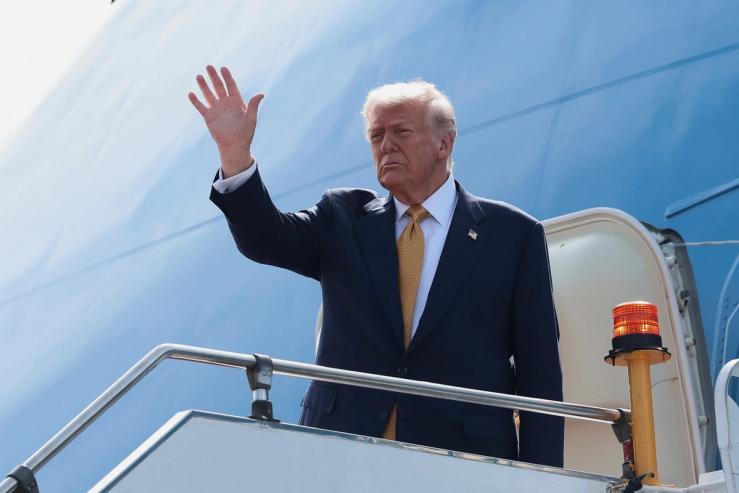The News
The news of a US-China trade framework emerging out of Kuala Lumpur this weekend harkens back to how diplomacy used to work: negotiators hammering out the terms of a complex deal before the principals fly in for the ceremony.
This all marks, The Washington Post dryly noted, a “significant de-escalation.”
No kidding. In fact, it represents something much more significant: the end of an anti-China moment in Washington that really began with Donald Trump’s election in 2016, intensified through the Biden presidency, went viral on Capitol Hill, and crested on “Liberation Day.”
This was, in retrospect, the Decade of the Hawks, the Washington-based China experts who forcefully made the case for confrontation.
This bipartisan group — ranging from former Trump aide Matt Pottinger and former trade adviser Robert Lighthizer to much of President Joe Biden’s circle, including China experts and Washington policy hands who have never set foot in the Middle Kingdom — shaped US policy. It found structure in the House Select Committee that, under former Rep. Mike Gallagher, became a pillar of the Washington discourse, but has faded since his retirement last year. Its goal was a re-ordered world, a decoupling between key US and Chinese spheres, and what its members saw as clear-eyed engagement in a new Cold War that had already begun.
Many in that group are holding their tongues in public. Everyone looking to do business in Trump’s Washington seems to be, these days. But key figures among them are reeling, and are privately saying that Trump’s dealmaking has cost the US its last, best opportunity to confront the People’s Republic.
The Malaysia talks “suggest Beijing may have gotten the better end of the bargain while our efforts with allies and partners continue to struggle,” a former China specialist on Biden’s National Security Council, Rush Doshi, wrote Sunday.
In this article:
Know More
Trump’s long, slow climbdown has been accompanied by a strong undercurrent of confrontation for the domestic US audience. “Give my warmest regards to Vladimir Putin, and Kim Jong Un, as you conspire against The United States of America,” he groused to Xi on Truth Social last month.
The same bravado came through in an appearance on Fox Business on Oct. 23, Treasury Secretary Scott Bessent appeared to take credit for getting the chief Chinese negotiator, Li Chenggang, fired. The comment left some observers scratching their heads: Li was still leading negotiations in Kuala Lumpur, though he left a World Trade Organization post.
And indeed, the structure of the Malaysia talks has been, for a Trump production, remarkably conventional. In the new Trump diplomacy, the only meeting that matters is the principals’. But in Kuala Lumpur, aides worked out the details — fentanyl and TikTok, rare earths and soy — and the principals are coming to town for the ceremony, it appears.
Ben’s view
Successful political leaders often thrive on ideological ambiguity. Was Barack Obama a neoliberal or a progressive? The Democratic circles that like to argue about these things are still arguing. Ronald Reagan is remembered as a ferocious Cold Warrior, but spent much of his presidency being accused by his party’s hawks of going soft on Moscow. Americans dislike ideological purity of all sorts; they seem to appreciate muddling through.
That hasn’t been the quality of much of Trump’s second term. His push for mass deportations, his legal attacks on domestic enemies, and his assault on “woke” college campuses all exceeded the wishes of his most fervent supporters.
But on the defining question of China, Trump seems to be working his way back even from a confrontation that he began and Biden escalated, toward something a little more like business as usual, deferring to the old Calvin Coolidge observation that the business of America is business.
Room for Disagreement
Eurasia Group founder Ian Bremmer wrote last week after a trip to Beijing that he’s pessimistic about relations between the countries in one key space: “AI trends are a core driver away from globalization,” he wrote. “The US and China are likely to have less understanding of each other and interconnection, at a time when underlying world systems (energy, climate, human capital, and the data to understand and change them) are and need to be more integrated.”
Notable
In the background of the China-US disputes, Canada has been trying to set its own path, and is now considering dropping its 100% tariffs on Chinese EVs.
China’s “growth model is so lopsided it is unbalancing the global economy,” Semafor’s Andy Browne writes. “China is at war with itself; taking the long view, the current US-China trade spat is a sideshow.”


